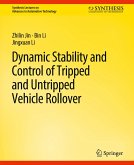To resolve the urban transportation challenges like congestion, parking, fuel consumption, and pollution, narrow urban vehicles which are small in footprint and light in their gross weight are proposed. Apart from the narrow cabin design, these vehicles are featured by their active tilting system, which automatically tilts the cabin like a motorcycle during the cornering for comfort and safety improvements. Such vehicles have been manufactured and utilized in city commuter programs. However, there is no book that systematically discusses the mechanism, dynamics, and control of narrow tilting vehicles (NTVs).
In this book, motivations for building NTVs and various tilting mechanisms designs are reviewed, followed by the study of their dynamics. Finally, control algorithms designed to fully utilize the potential of tilting mechanisms in narrow vehicles are discussed. Special attention is paid to an efficient use of the control energy for rollover mitigation, which greatly enhance the stability of NTVs with optimized operational costs.
In this book, motivations for building NTVs and various tilting mechanisms designs are reviewed, followed by the study of their dynamics. Finally, control algorithms designed to fully utilize the potential of tilting mechanisms in narrow vehicles are discussed. Special attention is paid to an efficient use of the control energy for rollover mitigation, which greatly enhance the stability of NTVs with optimized operational costs.








